Screening and Discussion: Keep the Change
February 1 @ 5:30 pm – 8:00 pm
(2018, 93 min. Rachel Israel, director, US)
Friday, February 1, 5:30–8 PM, 721 Broadway, Tisch School of the Arts, Room 006
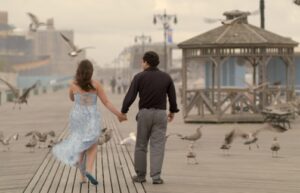
Courtesy Kino Lorber
Screening followed by discussion with:
Director Rachel Israel, and lead actors Brandon Polansky and Samantha Elisofon
Moderator: Janet Grillo (Filmmaker/Associate Arts Professor, NYU UGFTV)
Screening provides Audio Description (AD) and Open Captions (OC)
An offbeat NYC rom-com, this award-winning film features an unlikely pair who find that happiness is not about conforming. Starring actors on the autism spectrum who worked with the director to create the story.Winner, Best U.S. Narrative Feature and Best New Director, 2017 Tribeca Film Festival
Co-Sponsors: NYU Connections; NYU Center for Media, Culture & History
Performance and Discussion: MOVING MAD, QUEER, AND CRIP
February 28 @ 6:30 pm – 8:00 pm
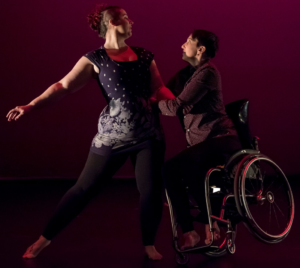
Danielle Peers, community organizer, artist, and a visiting professor in NYU Performance Studies, is an Assistant Professor at the Univ. of Alberta, and Director of the Media in Motion Lab.
Dr. Lindsay Eales disability scholar + founding Co-Artistic Director of CRIPSiE (the Collaborative Radically Integrated Performers Society in Edmonton), creating dance by/for people experiencing disability and their artistic and political allies for 12 years.
Lindsay and Danielle dance a quartet that embraces critical disability and Mad theory, spoken word, dance, and film, offering critical reflections on thegenerative possibilities of disability and madness in the arts
Discussion with: André Lepecki (Performance Studies) & Hentyle Yapp (Performance Studies, Art & Public Policy, Center for Disability Studies)
Co-Sponsors: Depts. of Art & Public Policy, Performance Studies; Hemispheric Institute for Performance & Politics
Collective Strategies for Reparative Care: A Panel Discussion
March 2 @ 3:00 pm – 5:00 pm
Presented in Collaboration with the Elizabeth Foundation for the Arts
EFA Project Space | 323 West 39th Street 2nd Floor NY, NY 10018
Collective Strategies for Reparative Care: A panel discussion with Ted Kerr (writer and organizer, What Would an HIV Doula Do?), Lana Lin (filmmaker, scholar, author of Freud’s Jaw and Other Lost Objects: Fractured Subjectivity in the Face of Cancer, 2017), Kevin Gotkin (artist, activist, and professor), and OlaRonke Akinmowo (creator, The Free Black Women’s Library). A reception will follow the event.
Audio Description for Dance: Lessons from Paramodernities
March 15 @ 12:00 pm – 1:00 pm 20 Cooper Square, Room 222
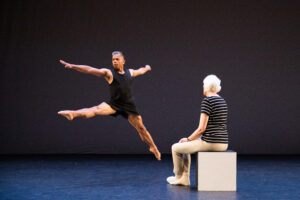
Join us for a lunchtime conversation between Georgina Kleege, Netta Yerushalmy, Mara Mills, David Linton, and Mary Murphy about their experience describing George Balanchine’s abstract modernist ballet, Agon, for both blind and sighted audiences. Their response to Agon is part of the Paramodernities series at New York Live Arts March 14-17th.
About Paramodernities:
After over three years of research, development, and multiple performances nationwide, the complete six-part Paramodernities series comes to New York.
The run is March 14th-17th @ New York Live Arts. Audio Description will be available for performances on March 16th.
This is an interdisciplinary epic work that weaves theory and performance into a four-hour-long hybrid event. A diverse cast of 20 exceptional dancers and scholars, ranging in age from 20 to 67, perform languaged and embodied responses to iconic modernist choreographies by Nijinsky, Graham, Ailey, Cunningham, Fosse, and Balanchine.
Screening and Discussion: GURRUMUL
April 3 @ 5:00 pm – 7:00 pm
IN COLLABORATION WITH THE REELABILITIES FILM FESTIVAL, APRIL 2 – 9, 2019
GURRUMUL
(2017, 93 min., Paul Damien Williams, Australia, Yolngu)
Wednesday, April 3, 5-7 PM, 721 Broadway, Tisch School of the Arts, Room 006
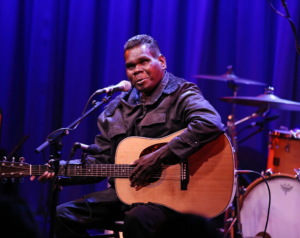
Discussion with Director Paul Damien Williams & Faye Ginsburg
Born blind, the late Indigenous Australian musician and Yolngu elder Gurrumul Yunupingu, was celebrated at home and abroad, straddling Aboriginal and global worlds in this extraordinary documentary chronicling his life.
Screening provides Audio Description (AD) and Open Captions (OC)
Co-Sponsors: Anthropology; Center for Media, Culture & History; NYU Native American & Indigenous Studies
Screening and Discussion: TALKING HANDS
Presented by the Colloquium for Unpopular Culture: TALKING HANDS (dir. Emanuel Almborg, 2016), 48 min – screening + director in conversation with Mara Mills

Launch Party: Crip Technoscience
April 26 @ 4:00 pm – 6:00 pm
A special issue of Catalyst: Feminism, Theory, Technoscience
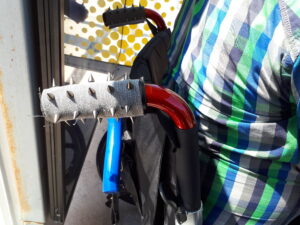 Friday, April 26 | 4-6pm
Friday, April 26 | 4-6pm
239 Greene Street, 8th Floor Commons
Celebrate a new special issue of Catalyst: Feminism, Theory, Technoscience with editors Kelly Fritsch, Aimi Hamraie, Mara Mills, and David Serlin and authors Kevin Gotkin and Alice Sheppard. Crip Technoscience brings critical feminist perspectives to the study of disability, science, and technology, offering interventions into political debates related to emerging technologies, treatments, and practices of access, design, health, and enhancement.
Co-sponsor: NYU Department of Media, Culture and Communication


